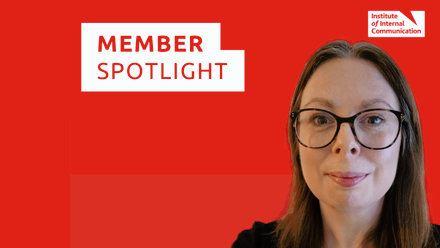How has the role of internal communication evolved since you started your career, and what key trends do you believe will shape its future?
I always had an interest in communications. I studied Media and Communications at GCSE, A Level, and then did a degree at BCU. Throughout that entire period, internal communications wasn't something I'd ever heard mentioned as a distinct craft. At university, internal comms barely featured - just a passing mention among modules on media relations or campaign planning. Like many others, I didn't actively choose IC; it gradually emerged during my career. Initially, internal comms was about writing newsletters and pushing messages onto the intranet alongside my primary responsibilities in media relations and external comms. It took several years before I realised IC was a strategic discipline in its own right.
A turning point came when I took the lead for digital and internal comms at Bromford. In that role, I began to see it wasn't just about sending emails or posting intranet updates - it was about creating genuine human connections. Seeing someone who spends their days fixing boilers directly raise an issue with the CEO via Yammer, and then witnessing positive change as a result, was incredibly powerful. Delivering major internal events for over a thousand colleagues, where people walked away energised and genuinely believing in our shared purpose, showed me the strategic impact internal comms could have.
I've seen internal comms evolve significantly over the past decade. We've moved from a purely tactical function - often overlooked or undervalued - to becoming a strategic partner essential for managing change, shaping culture, and connecting colleagues with the direction of the organisation. Increasingly, senior leaders recognise that effective internal comms directly influences engagement, morale, and business outcomes. But this progress isn't guaranteed; we have to continue advocating for our strategic role. The gains internal comms achieved during COVID could easily be lost if we slip back into old habits - or worse if we let leaders think we're just here to write nice emails and throw together a jazzy intranet post by 3 pm.
Looking to the future, the obvious trend everyone is watching is the need to lean further into digital and user-centred design. AI, analytics, and data will provide incredible opportunities for truly understanding and anticipating audience needs, leading to genuinely personalised and relevant communication. However, technology itself isn't the goal - it's just a tool. The real heart of IC lies in fostering deeper, more meaningful connections within our organisations. The past few years have dramatically reshaped how we work, with innovation increasing and bureaucracy falling away. To continue evolving and ensure organisations remain empathetic, inclusive, and adaptable, IC will need to become even more agile. I see our networks reshaping too, working closer with partners across the business - from external comms to finance and operations. Our future success depends on using collective knowledge to understand and anticipate organisational changes.
Why did you choose to pursue a Fellowship?
Initially, I approached Fellowship as a personal milestone - a recognition of career achievement. But as I learned more about it, I realised it represented much more: an opportunity to give back, share experiences, and contribute to the wider IC community. I genuinely enjoy mentoring others, sharing insights, and connecting with colleagues who care deeply about advancing our profession.
Fellowship isn't just about adding a line to your LinkedIn profile. It connects you with peers who are equally passionate about improving internal comms. The application process itself - which isn't just a tick box - provided some welcome external validation and helped quieten that nagging imposter syndrome many of us are all too familiar with. The insights gained from engaging with other Fellows strengthen my practice and enhance the value I bring back to my organisation. For me, Fellowship embodies both personal growth and professional responsibility, ensuring I, my organisation, and our craft can innovate and have a meaningful impact.
As an advocate for internal communication, what strategies have you found most effective in demonstrating its impact on organisational performance and employee engagement?
Internal comms often gains attention during crises like COVID or cyberattacks. The moment a data breach hits, the phones start ringing off the hook, or you're the one being asked to write a message that keeps 4,000 people calm and reassured - suddenly IC is the hero of the hour. But we shouldn't have to wait for emergencies to be recognised strategically. Effective IC teams are the pulse of an organisation; we deeply understand employee sentiment, how messages land, and the realities facing frontline colleagues.
At Bromford, our internal comms strategy led to measurable improvements in colleague retention and engagement. It genuinely influenced people's decisions to join and stay with us. At SJP, we're refining our channel strategy (to reduce email volume and noise), helping the executive team see clear links between comms efforts, business performance, and employee engagement. Our success came from storytelling grounded in data and having trusted relationships with leaders. The best internal communicators aren't just delivering messages - they're finding the golden thread, translating strategy into meaningful language and bridging gaps between executives and frontline teams.
Knowing your organisation intimately - its people, motivations, micro-cultures, and dynamics - is crucial. It's our job to listen carefully and represent colleagues authentically. Staying focused on measurement ensures we demonstrate impact rather than just activity, clearly proving the true value internal comms brings to organisational performance.
What has been the most significant challenge in elevating the importance of internal communication within an organisation, and how did you successfully navigate or overcome that challenge?
One significant challenge has been earning credibility and a seat at the strategic table. Often, internal comms teams are viewed simply as message deliverers, responsible for making things look pretty and sending out mass emails. I've experienced moments when my strategic input wasn't initially taken seriously, and that can feel frustrating.
Navigating this successfully required me to understand individual leaders - their goals, values, and preferred communication styles. Equally important was having genuine empathy and insight into our employees' daily experiences. Being a bridge between executives and the wider workforce demands emotional intelligence, patience, and strategic thinking.
When I've faced scepticism, I've relied on humility, data-driven storytelling, and persistence - subtle, on the edge of annoying, a constant voice in the back of your mind - to gradually shift perceptions. By consistently providing valuable insights, challenging respectfully, and demonstrating that my thinking considers the bigger picture, I built trust and credibility over time.
Difficult experiences such as mergers, change programmes, TUPE transfers, and redundancy consultations have been invaluable in teaching me these lessons. Each challenge reinforced the importance of empathy, adaptability, and resilience, ultimately positioning internal comms as an essential strategic partner. As mentioned, it's a shame adversity sometimes highlights our value more clearly than our day-to-day work, but I'll capitalise on it whenever it arises.
IoIC's #IChoseIC campaign aims to position internal communication as a career of choice. What advice would you give to someone just entering the profession to help them succeed and grow?
Firstly, genuinely appreciate that internal comms is a meaningful and rewarding career path in its own right. Early in my career, I didn't fully grasp that, and I wish I had. It's not just a subset of PR; it's a specialised and strategic profession deserving recognition and respect.
Build and maintain your network. Internal comms professionals are unusually generous with their knowledge because our common goal is enhancing the employee experience, not competing against each other. Take advantage of this openness - attend events, join online discussions, seek advice, and openly share your experiences.
Spend real time getting to know your audience. Engage directly with colleagues, listen to their challenges, and join informal conversations wherever you can. The deeper your connection with employees, the better communicator you'll become.
Never stop learning. Keep your skills fresh and stay curious about emerging trends, tools, and ideas. Don't be afraid to speak up and share your perspective, even when you're new to the role.
Finally, take pride in what you do. Internal comms often operates behind the scenes, but our impact on employee wellbeing and organisational success is enormous. You genuinely have the opportunity to make people's working lives better, and that's something to feel incredibly proud of.






